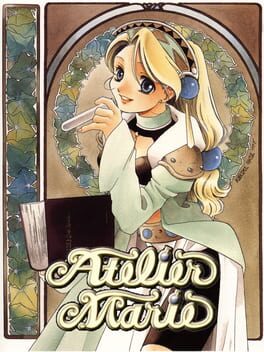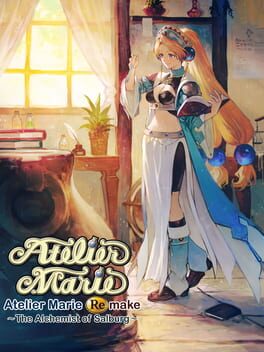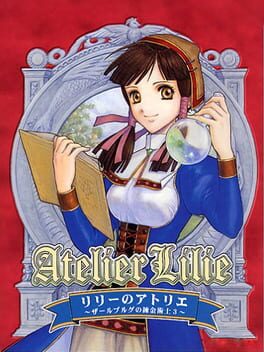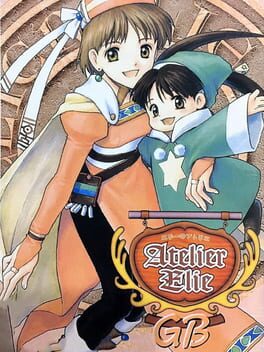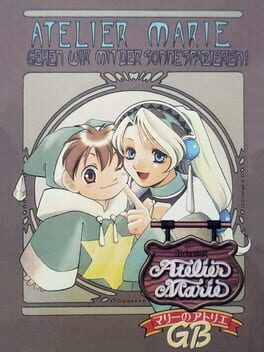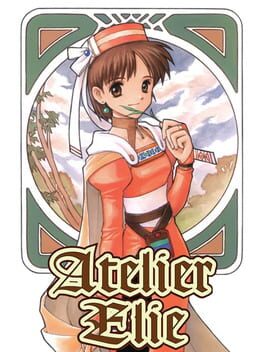
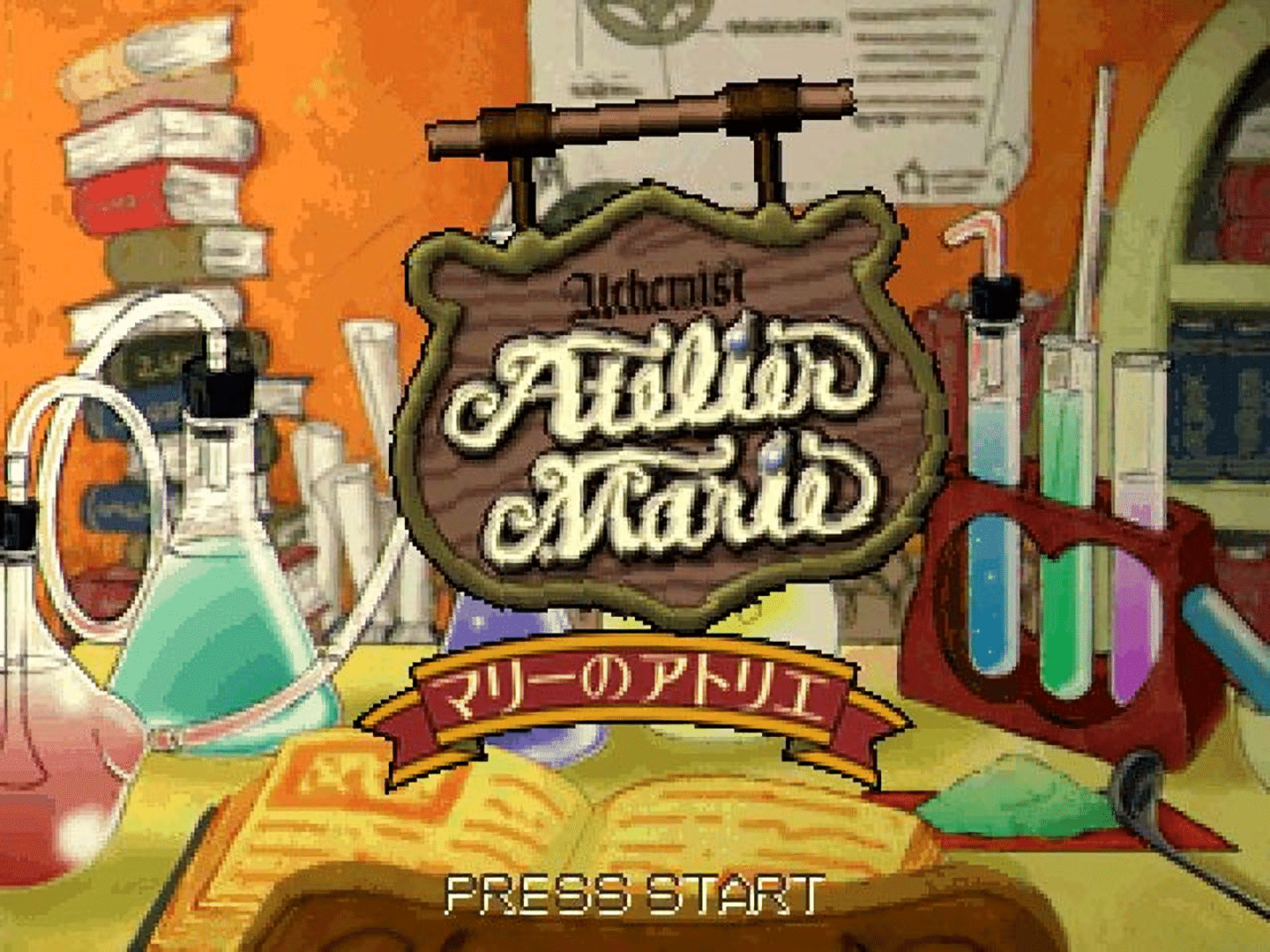
The game that started the Atelier franchise. Has never been released outside Japan.
Also in series
Reviews View More
My adventure through the Atelier series continues with what was the very first game in the series released wayyyy back in 1997. I had thought going through Atelier Judie would be a really big change from Atelier Rorona, given how old one was compared to the other, but I'd been quite surprised at just how much of the fundamentals were the same. Here in Atelier Marie, however, is where the real archaisms of the series lied. It was quite a learning curve just getting to grips with how the series worked back then, but I actually ended up enjoying my time with this much more than I thought I would. I played through the PS1 original version (via my PS3, as my PS2 is having some annoying audio issues), and while this is yet another game in the series that doesn't keep track of your play time, I reckon it took me some 40-odd hours to get the canon ending that leads into the sequel (although really I could've gotten any of them, as I effectively 100%'d the game save for one final item I couldn't be bothered to save scum enough to get).
Atelier Marie, as with virtually (but not quite) all Atelier games is the story of Marlone, or Marie, as her best friend Schia calls her. She is a student at the alchemy academy in Salburg, and she holds the proud distinction of having the worst grades in the history of the academy. In order to actually graduate, her teacher Ingrid gives her a special final task: In the course of five years of running her own atelier shop, she must create an item of good enough quality that Ingrid decides to let her graduate.
While Ingrid DOES call it a "shop" that you're running, it's really just the "filling item requests at the town bar" system that basically every Atelier game after this would use, and the whole "do X task before Y time limit expires" is solidified and executed on surprisingly well in this initial entry. There's not THAT much text or characterization, certainly compared to later games in the series, but what's there is funny and charming in the way that this series does best. My personal favorite part of Marie's personality being how aggressively little she cares about all of the city's festivals and events that Schia drags her to XD. The game takes a little while to get going, and ultimately the time limit you're given seems pretty generous (even with all of the usual save scumming for efficiency that I anxiously do in every one of these games that I play), as I had nearly 100%'d the game's content before the halfway mark of the 4th year. That said, it's a really solid first step for the series, and while mechanics of the game have certainly not aged fantastically and the messaging in the writing leaves something to be desired for 1997, I can definitely see why people fell in love with this series and why it got to keep getting sequels as long as it has.
Speaking of those mechanics, holy heckin' jeebus is this one oddball of a game when compared to even an entry as soon as Atelier Judie. There is SO much different about this game compared to later ones (and this is outside of stuff like UI refinements) I don't know where to begin, but I'll try to be as succinct as I can here. For starters, not only do you effectively have no cap on your item container (99 of any item is the max, but not total beyond that), and not only do items never expire, but items simply aren't unique. Item qualities and traits simply don't exist yet, and items of the same type are always completely identical to one another. This also means, by extension, that recipes never use generics or categories of ingredients, and items by and large take a bit longer to make than they do in other games. Viewing your inventory/container is kind of a pain with the UI as clunky and menu-heavy as it is, but overall it's a fairly familiar crafting system once you get beyond the aesthetics. You still make stuff to fill requests, you still get more recipes by buying them from shops or finding them via story events, and you still have to buy tools to help make stuff like you do in later PS1 and PS2 games. Though, weirdly enough, you don't have an alchemy level. You have a "knowledge" level that increases as you acquire more items, recipes, and even in-game information by talking to NPCs, and you have your character level that goes up by killing monsters and crafting items. Both of these things seem to increase your odds of successful alchemy, but it's not ultimately THAT different from how later games split your alchemy and adventurer levels.
You also don't have LP, but you also don't REALLY have MP or spells either. Non-basic attacking special moves are limited to one per character and are determined by the weapon they're using, and using these special moves can be done infinitely (I got a huge AOE one for Marie and she was heckin' MELTING fools by the end of the game XD) as they don't use MP. What DOES use MP is items, which anyone in the party can use as long as you equip them with them. Now the alchemist herself DOES have a ton of MP compared to most of the fighters that'll tag along with her, but the whole "only the alchemists can use items" thing that later games do is totally absent here.
Combat itself isn't thaaat difficult, or rather, it isn't terribly technical. Certainly not to the point where the lack of an ability to create your own weapons really matters to any significant extent. This has the whole grid-based rows and distance mechanics that later PS1 and PS2 entries would use a lot, but I really either felt that I was stomping enemies or getting my face stomped in myself, and a lot of that seemed to come down to "have I upgraded my weapons as much as I can yet?", "Am I using weak party members?", and "what level am I REALLY?". Combat is a really secondary thing in this game, and as long as you bring a big pile of healing items, you'll usually be able to at least limp away from fights even if you can't win them outright.
There's also some weird pacing in regards to when you unlock certain areas to gather items in (like you're gonna wanna go to the mountain asap, as even though you can't really survive there, the bar tender will tell you a rumor about a much closer, lower-level cave where you can get nearly all the same ingredients only AFTER you go to the mountain once), and the areas themselves are really odd. They really aren't areas, per se. They're more like screens you go to after several days travel, and then you pick to either gather another day, heal the party, or go home. There is absolutely no exploring of any kind in the wild areas outside Salburg.
Even the way you recruit your party members is odd, as they just have their own lives outside of you, and you actually need to get lucky enough to bump into them at the bar, alchemy shop, palace, or wherever. They still often cost money to get to come with you, and stronger ones generally cost more per-outing. While they don't have THAT much character to them, what IS there is generally fun and charming as the series is known for. My personal favorite (though I never really used him much) is the former bandit king who is only no longer a bandit king because you beat his gang up so bad that no one respects him enough to follow him any more XD
The game's art style is like the later PS2 games I've played in the series but even more chibi-looking (at least in the walking-around parts). The 2D illustrated stuff is quite 90's but much more appealing than I found Judie's art style to be, and I really liked the character designs in this (although the alchemists themselves are definitely a bit eccentrically dressed to really fit in with their surrounding NPCs much ^^;). In a challenge to my assumptions about the early games' music that I'd gotten from Atelier Judie, the music in this game is by and large really good, and it's of the quality I expect from the series. There are some odd choices, like just how jaunty and happy your workshop's theme is, but I still really liked it and the workshop theme is something I've heard so often that I think it will never leave my head XD
Verdict: Recommended. I really didn't expect myself to enjoy this game as much as I did. It's definitely in that PS1 JRPG space of "actually fairly simple but the UI is clunky enough that it has a bit of a learning curve regardless" going on, for sure, but it holds up surprisingly well given how long it's been since it came out. This and its sequel have a fan translation available online via the PS2 port of both games together, so this is one that can even be played in English (though I can't speak to the quality of the translation, as I haven't seen anything of it). If you're curious on the origins of the Atelier series, while this game certainly has its foibles and lacking in quality of life features, it's remains a pretty solid game in its own right, and if you're anything like me, it'll probably be something you get some fun out of despite all that stuff X3
Atelier Marie, as with virtually (but not quite) all Atelier games is the story of Marlone, or Marie, as her best friend Schia calls her. She is a student at the alchemy academy in Salburg, and she holds the proud distinction of having the worst grades in the history of the academy. In order to actually graduate, her teacher Ingrid gives her a special final task: In the course of five years of running her own atelier shop, she must create an item of good enough quality that Ingrid decides to let her graduate.
While Ingrid DOES call it a "shop" that you're running, it's really just the "filling item requests at the town bar" system that basically every Atelier game after this would use, and the whole "do X task before Y time limit expires" is solidified and executed on surprisingly well in this initial entry. There's not THAT much text or characterization, certainly compared to later games in the series, but what's there is funny and charming in the way that this series does best. My personal favorite part of Marie's personality being how aggressively little she cares about all of the city's festivals and events that Schia drags her to XD. The game takes a little while to get going, and ultimately the time limit you're given seems pretty generous (even with all of the usual save scumming for efficiency that I anxiously do in every one of these games that I play), as I had nearly 100%'d the game's content before the halfway mark of the 4th year. That said, it's a really solid first step for the series, and while mechanics of the game have certainly not aged fantastically and the messaging in the writing leaves something to be desired for 1997, I can definitely see why people fell in love with this series and why it got to keep getting sequels as long as it has.
Speaking of those mechanics, holy heckin' jeebus is this one oddball of a game when compared to even an entry as soon as Atelier Judie. There is SO much different about this game compared to later ones (and this is outside of stuff like UI refinements) I don't know where to begin, but I'll try to be as succinct as I can here. For starters, not only do you effectively have no cap on your item container (99 of any item is the max, but not total beyond that), and not only do items never expire, but items simply aren't unique. Item qualities and traits simply don't exist yet, and items of the same type are always completely identical to one another. This also means, by extension, that recipes never use generics or categories of ingredients, and items by and large take a bit longer to make than they do in other games. Viewing your inventory/container is kind of a pain with the UI as clunky and menu-heavy as it is, but overall it's a fairly familiar crafting system once you get beyond the aesthetics. You still make stuff to fill requests, you still get more recipes by buying them from shops or finding them via story events, and you still have to buy tools to help make stuff like you do in later PS1 and PS2 games. Though, weirdly enough, you don't have an alchemy level. You have a "knowledge" level that increases as you acquire more items, recipes, and even in-game information by talking to NPCs, and you have your character level that goes up by killing monsters and crafting items. Both of these things seem to increase your odds of successful alchemy, but it's not ultimately THAT different from how later games split your alchemy and adventurer levels.
You also don't have LP, but you also don't REALLY have MP or spells either. Non-basic attacking special moves are limited to one per character and are determined by the weapon they're using, and using these special moves can be done infinitely (I got a huge AOE one for Marie and she was heckin' MELTING fools by the end of the game XD) as they don't use MP. What DOES use MP is items, which anyone in the party can use as long as you equip them with them. Now the alchemist herself DOES have a ton of MP compared to most of the fighters that'll tag along with her, but the whole "only the alchemists can use items" thing that later games do is totally absent here.
Combat itself isn't thaaat difficult, or rather, it isn't terribly technical. Certainly not to the point where the lack of an ability to create your own weapons really matters to any significant extent. This has the whole grid-based rows and distance mechanics that later PS1 and PS2 entries would use a lot, but I really either felt that I was stomping enemies or getting my face stomped in myself, and a lot of that seemed to come down to "have I upgraded my weapons as much as I can yet?", "Am I using weak party members?", and "what level am I REALLY?". Combat is a really secondary thing in this game, and as long as you bring a big pile of healing items, you'll usually be able to at least limp away from fights even if you can't win them outright.
There's also some weird pacing in regards to when you unlock certain areas to gather items in (like you're gonna wanna go to the mountain asap, as even though you can't really survive there, the bar tender will tell you a rumor about a much closer, lower-level cave where you can get nearly all the same ingredients only AFTER you go to the mountain once), and the areas themselves are really odd. They really aren't areas, per se. They're more like screens you go to after several days travel, and then you pick to either gather another day, heal the party, or go home. There is absolutely no exploring of any kind in the wild areas outside Salburg.
Even the way you recruit your party members is odd, as they just have their own lives outside of you, and you actually need to get lucky enough to bump into them at the bar, alchemy shop, palace, or wherever. They still often cost money to get to come with you, and stronger ones generally cost more per-outing. While they don't have THAT much character to them, what IS there is generally fun and charming as the series is known for. My personal favorite (though I never really used him much) is the former bandit king who is only no longer a bandit king because you beat his gang up so bad that no one respects him enough to follow him any more XD
The game's art style is like the later PS2 games I've played in the series but even more chibi-looking (at least in the walking-around parts). The 2D illustrated stuff is quite 90's but much more appealing than I found Judie's art style to be, and I really liked the character designs in this (although the alchemists themselves are definitely a bit eccentrically dressed to really fit in with their surrounding NPCs much ^^;). In a challenge to my assumptions about the early games' music that I'd gotten from Atelier Judie, the music in this game is by and large really good, and it's of the quality I expect from the series. There are some odd choices, like just how jaunty and happy your workshop's theme is, but I still really liked it and the workshop theme is something I've heard so often that I think it will never leave my head XD
Verdict: Recommended. I really didn't expect myself to enjoy this game as much as I did. It's definitely in that PS1 JRPG space of "actually fairly simple but the UI is clunky enough that it has a bit of a learning curve regardless" going on, for sure, but it holds up surprisingly well given how long it's been since it came out. This and its sequel have a fan translation available online via the PS2 port of both games together, so this is one that can even be played in English (though I can't speak to the quality of the translation, as I haven't seen anything of it). If you're curious on the origins of the Atelier series, while this game certainly has its foibles and lacking in quality of life features, it's remains a pretty solid game in its own right, and if you're anything like me, it'll probably be something you get some fun out of despite all that stuff X3
Played 1+2 but separating them since they're two games.
It's actually a cute proof of concept and takes a certain amount of bravery to make something like this in an age of very by-the-books RPGs. Marlone is a lovable protagonist and everything in the game is straightforward. I feel some of its beauty is in its simplicity, which has been lost in later Atelier games.
It's actually a cute proof of concept and takes a certain amount of bravery to make something like this in an age of very by-the-books RPGs. Marlone is a lovable protagonist and everything in the game is straightforward. I feel some of its beauty is in its simplicity, which has been lost in later Atelier games.
